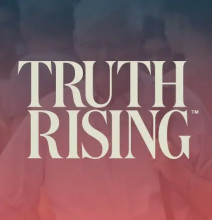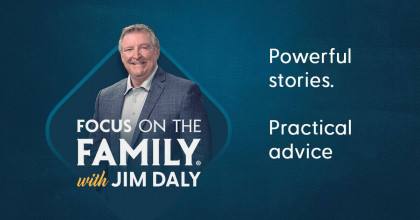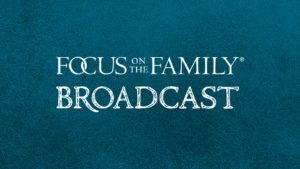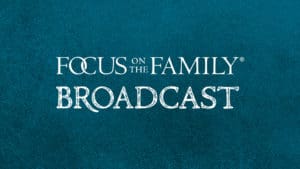Senator James Lankford: You know, once you start talking to people and you begin to diffuse it and say, “Okay, you’re right. Alright, set that one aside. Let’s talk about some other things on it.” You can very often find some areas we do agree on and say, “Okay, we agree on that. We disagree on that. Let’s start working on the areas we disagree on.” Let’s just talk about it at least.
John Fuller: Hmm. Some good advice from Senator James Lankford about finding common ground where there’s disagreement, and that seems like a very appropriate message today on this National Day of Prayer. Welcome to Focus on the Family with Jim Daly. I’m John Fuller.
Jim Daly: John, Senator Lankford has a great new book called Turnaround: America’s Revival, focusing on the things we can do as Christians to promote peace and biblical values in our nation. He suggests that the most effective way to turn the nation around is to start in our own families and communities. That makes all the sense in the world, and that’s what we’ll be discussing today. Of course, the biggest challenge is learning, uh, to get along with those who oppose our views. You know, in 2nd Timothy, I think it’s right around, uh, 2:24, it says to endure evil patiently.
John: Mm-hmm.
Jim: I- I struggle with that. I don’t know about you, but it’s a hard one for me to endure evil patiently. Uh, but I think the Lord knows the heart of that person is what He’s after, the person that’s blinded.
John: Hmm.
Jim: And, uh, these are the kinds of things I talk about on my podcast, ReFOCUS with Jim Daly. And recently I had a great conversation with Senator Lankford, and we’ll be sharing a portion of that today.
John: Right. And, uh, Senator Lankford represents Oklahoma, and he’s served in the US Senate for more than a decade. And, uh, before that he was in the House of Representatives. Uh, the book you mentioned, Jim, Turnaround: America’s Revival, uh, is available from us here at Focus. You can stop by focusonthefamily.com/broadcast to get your copy. And let’s go ahead and hear a portion now from the podcast ReFOCUS with Jim Daly, in which Jim spoke with Senator James Lankford.
Jim: Senator Lankford, thanks for joining me today on ReFOCUS.
Senator Lankford: It is absolutely my pleasure to be able to join you. Thanks for all you do.
Jim: You know what I’m always excited about when I talk to you, uh, you’re a man of faith. You were a youth pastor for a long time, and you’re just able, uniquely, I think, to maintain your Christian witness in an environment that goes right at the core of that, and it kind of pushes you or pushes most people into the flesh, if I could be that bold. So I guess the first question is, how do you maintain an attitude of righteousness in that environment? Educate me.
Senator Lankford: Uh, well, it- it is a challenge as it is for every person in every place. Whether you’re working in a warehouse, driving a truck, or whether you’re working in an office or working in Congress or teaching in college. Uh, you make a decision about who you follow. And for me, it’s getting up every day trying to reset my mind. I- I read the Psalms every morning that kind of reorients me to say the challenges that I face are not new. Uh, they’re ancient. Uh, and it kind of redirects my mind and then I just thank God for the tasks that I have and go at it. Um, understanding that this is a challenge, uh, where we are in culture, to say the least. And I honestly try not to be personal about it. Uh, there’s a difference between people attacking me and people attacking my title. Most people are just attacking my title all the time. It’s a political world. They get mad at politics. They just scream at anyone in politics or attack us or try to say, “You need to be more like me, not like you.” And I try to say who God has made me to be and stay consistent with that.
Jim: I, uh, I can remember flying into DC for meetings. I think I was going over to tape with, uh, at that time, Secretary of State, Mike Pompeo. So this was, you know, five, six years back. And, uh, I had a bad attitude. I mean, I’m landing at Reagan and I’m saying to myself, “Lord, why do I have to be here?” Of course, you have to be there every day. But, uh, I remember getting to the State Department and this wonderful assistant of Mike Pompeo’s came out. Ruth was her name, and here I am with this attitude. And, uh, she comes up and says, “Oh, Mr. Daly, I love Adventures and Odyssey. I listen to it at lunchtime every day with a about a dozen others, uh, that work here at State Department.” And I’m like, “Okay, Lord, I get it.” Like He’s got His-
Senator Lankford: Yeah, reset reset.
Jim: Yeah. He’s got His people everywhere. And, but speak, I think the reason that is kind of a, an important question. Those of us that aren’t in the Beltway, those of us that, you know, we’re not hanging on every word that’s coming outta Washington, and that we can, as Christians even, develop a little bit of an attitude about the government, about its role. Um, what- what would you say to us, uh, just about that negativity?
Senator Lankford: Jim, that’s a great question on it. And let me put a little more fine point to it. Yesterday I was visiting with someone in the DC Press Corps that they were literally following me through the hallway, peppering me with questions on different random things. And then they stopped and said, “Hey, have you, have you ever listened to anything with Focus on the Family?” I smiled and said, “Yes, I have actually.” They said, she said, “I grew up listening to Adventures in Odyssey and I thought maybe you were a youth pastor and maybe you were familiar with that as well.” And she started talking about it. But I- I say that to you to say, not just because of what you’re doing all the time, but you’re right, there are people that say that swampy, freakshow, dark, evil, that’s in Washington DC but yet God has put lights and witnesses in the media and elected officials and staff, and they’re these places, and sometimes it’s easy just to dismiss everybody’s evil, everybody’s bad. And I think God sees, He knows, and He’s putting people in certain places at certain times and is calling them to a task to be able to be obedient and to be able to engage in culture in that way. So yes, there are lots of perspectives and there’s lots of attitudes. Uh, but as I like to tell people at the end of Sodom and Gomorrah, God was pulling everybody out.
Jim: Huh.
Senator Lankford: He’s not pulling everybody out. He’s still sending people in. So that tells me He’s not done with our culture. What He’s not done with, we shouldn’t be done with. And we should be welcoming to be able to engage. Okay, where do I go? Uh, as simple as I can make it on this, Jim, uh, I have folks that I say to them, “Listen, you scream at the TV, at the people that you see and that you get angry about it. Before you scream at the TV and somebody in politics, number one, realize they can’t hear you. You’re not actually fixing anything. Number two, those are the people that are in my mission field.”
Jim: Hmm.
Senator Lankford: Uh, those are people I’d encourage you to be able to stop and to pray for and to say, “Okay, God, we disagree on this.” Okay. I- I’m, I’m praying for them, for their family, for wisdom, for direction. And we, we are, as a culture headed into a very dark place, as a culture, getting angrier and angrier. And I see that on the TV, God, what would you do to be able to engage with that?
Jim: Yeah. And I so appreciate that because I think, A, we need to be as Christians, we need to be in that arena and I pray for you regularly. I’m so glad that you and others are there. You know, let me ask you this. Uh, you know, when I’m traveling and meeting people that do know the issues, they’re very aware and in tune. Um, part of what I encounter sometimes is when you are trying to work with people on the opposite side and trying to find places that you can work together to solve problems, all of a sudden, then I’ll start hearing something maybe about Mike Johnson, who is a wonderful believer. He’s a great brother in Christ. Yourself or others. You know, I kind of come to your defense because I’m saying, “Guys, don’t give up on these men that we know and women that we know that are believers in that effort.” How can we pray for you? How can we better defend you when you’re trying to do the country’s work and be a Christian all at the same time?
Senator Lankford: Yeah. It is interesting me, the number of people that I meet at church or in other places, or people that name the name of Christ, that they think about politics in a different way. They say, “Well, the Christian stuff that, you know, I try to be nice to people and I go to church, but when it gets to politics, this is a rough sport. You need to hit people in the face.” It is as if Jesus, when He was asked what the greatest commandment was, and He said, “Love the Lord your God with all your heart, soul, mind and strength.” The second is like this, “Love your neighbor as yourself.” That Jesus paused and said, “Unless it’s about politics, then hit them in the face as hard as you can.”
Jim: Yeah. (Laughs).
Senator Lankford: That, that’s not what it was. Uh, so for all of us that are followers of Jesus, and quite frankly, that’s for many people, not just in the arena, but watching the arena of politics, that doesn’t change. That simple greatest commandment was not greatest suggestion. That was how do you live that out? So how do you strongly disagree with someone and still love your neighbor as yourself? When politics becomes very personal, uh, it becomes how can I actually personally attack that person enough to destroy them so that they’re out of the way and I can get to the next person and take them on. That’s what modern politics has really become. But that’s not what Jesus teaches. And if I can make it just as simple-
Jim: Yeah.
Senator Lankford: Read Titus chapter 3, or read 1st Timothy chapter 2, or read 1st Peter chapter 2. There’s key places where the writers are all challenging, here’s how we engage with authority. Here’s how we engage with government. None of those are hit them in the face as hard as you can. That was not the biblical command. Biblical command was very different. If I’m gonna look at it and ask the question, which one works? 2000 years later, we’re still talking about the teachings of Jesus, the last political person we’ve all forgotten about.
Jim: Yeah. Turnaround, this book that you’ve written, which is a great read, by the way, if you haven’t read it.
Senator Lankford: Oh, thanks.
Jim: (Laughs).
Senator Lankford: I have. Yeah.
Jim: (Laughs). I hope so. But the, uh, going kinda shifting a gear and going back to your childhood, you and your brother, something we share was being raised by a single mom, single-parent mom.
Senator Lankford: Yeah.
Jim: Describe the good things that came out of that and maybe some of the hardships for you and your brother ’cause these, these are the things that help form our opinions on things, and especially in our youth. You know, things that we experience are deeply rooted in our heart.
Senator Lankford: Yeah. It does matter a lot. Thanks. I- I appreciate you calling that out as well. The- the- the Turnaround book has actually been three years of writing for me. A lot of weekends, a lot of time on planes and, uh, getting a chance to be able to write slowly, go back through it, edit it, re-edit it. Um, it’s not just biography, though. There are stories from my life, uh, and it’s not just my political life, it’s in my life as well in ministry and growing up, it’s a lot about who we are as a people. Um, my goal with the book Turnaround was to say, “We don’t turn around a nation by just having a vote. The nation turns around by people turning around.” If I can say just as simple as, uh, “Washington DC doesn’t change the culture, the culture changes Washington DC.” So I ask the question, how does culture change then? What- what- what are the impacts there and it’s families, it’s communities? It’s that- that- those conversations that are local. It’s churches and how we actually engage. So as people see DC as an angry, divided place, say it’s because we’re an angry divided country right now. That’s why it looks that way in Washington DC. So what do we do to be able to turn around the nation? It’s not the next vote, it’s what we do personally on it. And so it’s a spiritual conversation. It’s not so much a political or policy conversation, though there are some things that are in that, obviously based on what’s going on. But I wanted to be able to walk through that, including, as you mentioned, my own childhood. Uh, my parents divorced when I was four years old. I have great respect and honor for my mom and my dad. They’re two very different individuals. I used to jokingly say, I- I don’t remember my parents being married and I actually can’t imagine my parents being married because they were just two entirely different people on it. But a great respect for both of those. Uh, so growing up with my mom and my older brother has a whole different experience for me in that. But going to college, getting into politics, doing youth ministry for 22 years, those are all different stages and I’ve watched God be faithful in every single one of those.
John: Senator James Lankford on Focus on the Family with Jim Daly. You can hear the complete conversation from Jim’s podcast. Just visit refocuswithjimdaly.com. And Senator Lankford’s brand new book is called Turnaround: America’s Revival. And you can get a copy of it at focusonthefamily.com/broadcast.
Jim: Many people that I encounter right now, they’re really concerned about the temperature, the emotional temperature in the country, people being described as so angry at one another. Of course, right now we’ve got all the things that are happening at Tesla dealerships, people burning Teslas to protest Elon Musk, et cetera. But it’s probably right now, the example of that anger overflowing. Where does this go? How do we get a recalibration where people can actually work on the issues together and kind of defuse some of this energy that seems like it’s taking us potentially in the way people are saying it to me is like, “Is this gonna lead to another civil war of some sort?”
Senator Lankford: Yeah, it cannot and it should not. I- I actually have had people flippantly talk about civil war, all those things. I’m like, hold on. Time out. 600,000 Americans died in the Civil War. That’s not a flippant thing to be able to just discuss. And I do talk about in the book, those of us in Oklahoma, and specifically, I live in Oklahoma City, those of us in Oklahoma City, understand this better than most parts of the country. 30 years ago, a guy who was mad at the government drove up to a federal building with a rider truck, exploded the rider truck and killed 168 men, women and children that were in that federal building simply because he was mad at the federal government. This anger that just spirals and spins up inside of people. Some people, they just get angry, but some unstable people pick up that cultural anger and decide, “I’m gonna do something about it.” And for that guy, he killed 168 people and the worst act of domestic terrorism our nation has faced because he was mad at the federal government. So for all of us, we need to deal with unchecked anger and to determine where does this go? And there are a lot of people saying flippant statements right now that I have to push back on them and to say, “Hey listen, as an Oklahoman, I know where that goes. I’ve seen it. That’s not where we need to be able to go as a country. That doesn’t solve a problem. That is much, much worse.” So I spend a little bit of time in the book, turn around, I spend a little bit of time talking about anger. What is that like in our culture? How do we model this for our kids? How do we actually handle things like social media? There’s lots of things on social media that are just false. Social media is designed to get you to look at it again and look at it longer. And one of the most effective tools is fear and anger. If I can make you afraid or if I can make you angry, you stay on it longer. So they effectively use that tool of fear and anger. But the problem is when you don’t look away from it, you get caught up in those things and now you’re down the rabbit hole of fear and anger and your family suffers for it. Your workplace suffers for it. You suffer for it, personally. So I talk a lot about how do we deal with this as individuals and not just assume all the anger’s in DC. That’s just not true. And as I joke with people on this, but it’s really serious. I ask people a lot when they complain about the anger in DC and I say, “What was it like at Thanksgiving with your extended family last- last time?”
Jim: Right.
Senator Lankford: Everybody got together. Because often it’s one crazy cousin comes and they start arguing and everybody leaves early and I go, “Hey, this is where the country is. So the best way to handle this is for each individual to deal with it differently.”
Jim: And I think one of the things that you’ve demonstrated so well, and I hope that people would say that of me, is when we do have dialogue with people that disagree with us, they feel those things. And you know, a quick example, I won’t name names, but someone from the LGBTQ community for me that I’ve really gotten to know well over the last 15 years, we have very open dialogue about all kinds of things in that space. And uh, you know, probably the high watermark for me is when he texted me not long ago and said, “You know, every time I talk with you or meet you, you push me closer to God.” And I just, I texted back and I said, “That’s my job.” (Laughs). And I think you probably feel the same way. I mean, in the big picture of things, the overarching thing is these people that don’t know the Lord have been taken captive by the enemy. That’s what the Word says, that they’re like POWs. That they’ve been blinded spiritually and that our job is to help influence them to see God’s path as the better way to go. Um, how do you engage people? Give us that engagement one-on-one talk about how you are hit with something like that from an opposition person, but you diffuse it with what technique?
Senator Lankford: Yeah. There’s a couple things that come to mind. One that was a senator, he is now passed away now that I had the opportunity to be able to meet several years ago. Senator Johnny Isakson from Georgia. He had a saying in his life, “I only have friends and future friends.” Uh, and that’s always stuck with me that- that when you engage with someone who vehemently disagrees, he’s like, “That’s a future friend, not a friend yet. Uh, but I’m gonna continue to encourage them.” What I do is I try to go back to people and say, you and I disagree on this issue. Let’s find an area we do agree on. Uh, and we will keep talking it out, if they’ll allow it. Some people now in the modern culture, they just wanna scream, make a social media video of them screaming at someone, post it and walk away. They don’t want to have dialogue. Well, they’re not ready for that at that point. I need to understand, they’re screaming at my title more than screaming at me. Uh, and what they’re trying to do to be social media famous. Uh, but for a lot of people they are just upset, frustrated, angry, and they wanna know does anyone hear them? And I think one of the most important things is, yeah, I want you to be heard. Whether it’s in a business life or in a family or in a neighborhood, there are people that isolate each other and say, “That’s them. We don’t talk to them.” That’s a huge problem. When there’s a them around that we just don’t talk about and refuse to be able to engage, we’re literally telling our family to be isolated. This can be racial barriers, it can be political barriers, uh, there’s all kinds of different issues that do rise up on it and so I just try to be able to diffuse that. I tell the story at one point when I was at the airport in Oklahoma City and a person who is very liberal came up to me and said, “You don’t represent me. You don’t represent my values.” And I asked them, “Okay, do you know someone in the Senate that does?” And they listed several of my very liberal counterparts. They- they supported them. I said, “Okay, you have a voice that’s in the Senate. You’re right. I don’t share the same values. Let’s talk about things we may agree on.” We agreed on the Oklahoma City Thunder. We agreed on some restaurants in town. We agreed on some tax policy issues. You know, once you start talking to people and you begin to diffuse it and say, “Okay, you’re right. Alright, set that one aside. Let’s talk about some other things on it.” You can very often find some areas we do agree on and say, okay, we agree on that. We disagree on that. Let’s start working on the areas we disagree on. Let’s just talk about it at least. Some people will do that. Some people are so angry they just will not, but where you can, I think you should.
Jim: That’s a great thought. Senator right here at the end, I think it’d be great to quickly go through, um, what you called six principles to help turn up the light. Uh, these are the things people might wanna jot down or rewind and listen to again. But number one, do the right thing the right way. Why the right way part? What is that getting at?
Senator Lankford: Yeah, there’s a couple things. Lemme just set up the, the whole turn of the light kind of conversation ’cause there’s several chapters. I spend a little bit of time on this topic and that is the world, well, just the most basic thing is when you walk into a room, there’s not a dark switch. You can’t turn dark up and down. You turn light up and down. And that most basic principle, people forget just in our normal daily lives. If- if it’s dark, if it’s angry, they don’t need less dark, they need more light. So how do you actually increase light in a dark place rather than go into somewhere and say, “I want it to be less dark.” Well, less dark is actually more light. So the first principle of that is do the right thing the right way. And that is, there is a right thing to do and there’s a right way to do that. And I think that’s very important to be able to do it. There’s a lot of times we see in politics or in business or in family life saying, “I got the thing done that needed to be done.” But there’s a debris field of relationships around you. You did the right thing, the wrong way. I don’t see that in Jesus. I see in Jesus, Him doing the right thing, the right way. Sometimes it was to push hard and sometimes it was to be quiet and listen. Uh, but doing the right thing the right way, I think matters a lot. I’m turning down anger and turning up light.
Jim: I- I love that. The- the other, the next one, uh, ask if-then kind of questions. That sounds like a marriage idea as well. And you’ve said this a couple of times, it kind of applies in, in DC or in your marriage or with your parenting.
Senator Lankford: Yeah. In- in your business, whatever it may be. When you’re about to make a decision, especially if you’re about to say something, just to check yourself and say, “If I say this, if I do this, then what happens next?” If you wanna turn the volume down in a fight, in an argument, it is to say, “If I scream back at this person, what’s the natural response?” Well, it’s to scream right back and to be able to just keep elevating, elevating. “If I do this, then what actually happens next?” Is a great way to be able to check yourself in whatever decision making you may make. Especially when you’re dealing with culture and anger, your family, your community. You may discipline strongly, somebody in your family, your children, whatever it may be. Then what happens based on that? So how do you direct in a way that actually helps rather than long-term hurts?
Jim: I like that. Third was keep your perspective. Why is that so hard for human beings? (Laughs). This is a good one.
Senator Lankford: Oh my gosh, yeah. We do lose our perspective. In fact, I end the book with a conversation about perspective and trying to be able to maintain that. Just keeping your perspective, some things look enormous, but they’re really not as big as it sounds. So sometimes we blow up and go, “Oh my gosh, this is the worst possible day.” And I hear people all the time, “America’s never been angrier. We’ve never been more divided. We’ve never been,” I was like, hold on. The Civil War was bigger than this. Okay. What we were experiencing in 1968 was bigger than this. We’ve had some very difficult moments before. Let’s keep some perspective. It doesn’t mean it’s not bad. We need to get to work, but screaming, “We’re all gonna die,” doesn’t actually solve the problem on it. It actually makes a bad situation worse. So keeping some perspective actually makes a big difference. And I tell a really funny story from a friend of mine during the section of the book to talk about somebody that was out of perspective.
Jim: Let’s hit these others quickly. Eat less poison, take more vitamins.
Senator Lankford: Yeah. So people that get- live on social media and 24 hour cable news all day long, they’ll tell you honestly, “Oh, it’s terrible for me.” I- I get in such a bad mood on them, like, “Okay then why are you taking in all that poison all day long? How are- when can you add good things to your perspective? I talked before about, I read the Psalms every morning. That’s part of me taking in more vitamins because I know I’m gonna be drinking in cultural poison all day long. I’ve gotta find a way to get good and limit my intake of the bad. The bad comes at you, but you don’t have to choose it all the time.
Jim: Yeah.
Senator Lankford: So if you live on social media, get off of it as much.
Jim: Boy, that’s so good. So many people I know are doing that now. You know, less poison, more word. Uh, I- I went over- do something productive. Anything (laughs). What was that?
Senator Lankford: When you get angry, you’ve got all this energy built up into you and so people want to type out an email, worst possible thing you can do. Okay. That that’s the worst. You know, don’t, don’t just get angry and go vent on somebody. Go serve. Literally when you get angry, you get caught up. You got this burst of energy. Find people, you can actually help because many times we get angry and we get self-focused. One of the best ways to turn anger off is to get others focused and go, “Who can I go help right now?” I don’t care if you mow your next door neighbor’s lawn. Go serve when you get this anger on it and get out of the spiral of anger.
Jim: And bring your kids to do it too. That’s a great way to help them.
Senator Lankford: Absolutely.
Jim: So next, uh, would be determine whether our righteous anger is really righteous. Before you answer on that one, I had a radio guest actually I was talking to about this. He said, “Hey, in the end, there’s only one person who’s allowed to be righteously angry. That’s God.” (Laughs). I thought, wow. He’s the one that qualifies for righteous anger. The rest of us are sinners.
Senator Lankford: Yep. Yeah. We are not righteous. Uh, I gotta give the spoiler alert on this one. There is no such thing as righteous indignation for us. Now, the scripture’s pretty clear. In your anger, don’t sin. We are gonna get angry. That’s a natural human response to situations, to injustice, to when people attack us. There’s a human response immediately to anger. But in your anger, don’t sin. It’s the challenge of being able to say, “Okay, I- if I’m living angry all the time, it’s not righteous anger on that.” And- and I do have in a political world, people catch me and say, “Jesus flipped the tables in the temple and he got a whip and drove people out.” I’m like, “Yeah, that did happen.” But for every one time you can see Him saying, “Hey, this is the wrong way to do it.” You’re gonna find Him saying, “Turn the other cheek. Love your neighbor.” Uh, serving people. I mean, there’s a lot more of that than there is a flipping tables if you’re flipping tables all the time. It’s not righteous anger. It’s an anger management issue.
Jim: Yeah. Anger management. That’s a good way to say it. Senator Lankford from Oklahoma, thank you for being with us. Thanks for your time, obviously, and thank you for what you do to serve the Lord first and foremost, and then our country in the Senate. Please thank Cindy for us too and the girls.
Senator Lankford: I will definitely pass that on. Thank you. God bless you. Let’s continue to be able to do the most simple things, to be able to love our neighbor as yourself and be able to pray and watch what God does through it.
John: Some great encouragement there from Senator James Lankford on today’s episode of Focus on the Family. And you can hear the entire conversation, which is from Jim’s podcast, ReFOCUS with Jim Daly. Uh, we’re gonna link over to it. You’ll hear more about the Senator’s family and how he was called into serving in government and more about the pro-life movement. And you can listen at refocuswithjimdaly.com.
Jim: And I so appreciate, uh, Oklahoma Senator James Lankford and what he stands for and how he is representing the Lord in DC. There is a host of more conservative politicians that are Christians that I think really, uh, put their faith first and then operate in that very difficult environment. And I think he’s setting such a good example for all of us on how to engage people in conversation and show them respect when we have disagreements. Changing the culture doesn’t just happen at the voting booth. We have far more responsibility as Christians to influence the culture by the way we live in our communities and within our families and if we can do that well then neighborhoods change and eventually the nation will change. And you might ask yourself, “Well, how do I do that?” Well, be that good neighbor, volunteer for a non-profit in town that is a soup kitchen or something that they’re doing good deeds in the community, uh, and find other ways to get involved in your community when we love and serve and share our faith, that’s how we can turn this country around. And on this National Day of Prayer. Also, uh, remember to pray for our nation. To be further encouraged and inspired, uh, get a copy of Senator Lankford’s new book from us. It’s called Turnaround: America’s Revival. And when you make a gift of any amount, send you a copy as our way of saying thank you for being part of the ministry.
John: Mm-hmm. Yes and your gift goes directly into reaching out and, uh, telling others about Christ and so we rely on your support. Give generously when you call 800 the letter A and the word FAMILY, 800-232-6459 or you can donate online and request that book at focusonthefamily.com/broadcast. And coming up tomorrow, Bob and Wendy Griffith share their transformative experience with foster care.
Dr. Bob Griffith: I believe that’s what love is and that your heart truly is big enough to take a piece of it and give it to a child even for a period of time, and that that will impact their life forever.
John: Thanks for listening to Focus on the Family with Jim Daly. I’m John Fuller inviting you back next time as we once again help you and your family thrive in Christ.



















